

Nine Worlds of The Norse. Native American Spirituality. Deep Ecology. Spirituality Rooted in Africa. Drug Culture. Paganism. Wicca. New Age. LGBT Spirituality. Feri Tradition. Mythology. Esoterica. Eastern Spirituality. Spirit Science. Abrahamism. Near East Spirituality. Metaphysics. Pantheism. Transcendentalism. Atheist, Gnostic, Theist, Agnostic. Too many times I have informed someone that I am an atheist, only to have them reply, “Oh, but how could you know that God doesn’t exist?

You’re taking a faith position!” Many headaches later, we finally come to an agreement over the definitions of these words. This arrangement is an attempt to clarify and classify these words, so that their rogue meanings no longer confuse and muddle religious debate. To begin with, here are the four key terms arranged on a graph with their opposites across from them. This should allow a very rough placement of one’s theological position.
Now here are the terms defined. The horizontal axis concerns WHAT YOU BELIEVE: The vertical axis concerns WHAT YOU THINK WE CAN KNOW: So, to restate: These four labels can be very useful in describing the way we feel about gods. An atheist agnostic is someone who does not believe in gods and also thinks that the existence of gods cannot be known. Politics, Religion and Philosophy. Major Religions of the World Atheistic Philosophies Faiths and Movements Wiccan/Pagan and Earth Religions New links: 5-June-2006 Stanford Encyclopedia of Philosophy.
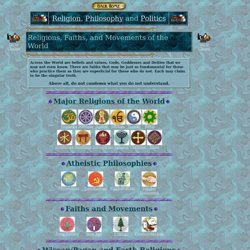
Spiritualism. By 1853, when the popular song Spirit Rappings was published, Spiritualism was an object of intense curiosity.
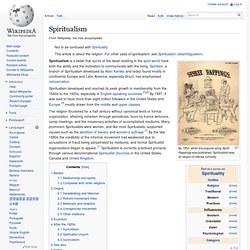
Spiritualism developed and reached its peak growth in membership from the 1840s to the 1920s, especially in English-speaking countries.[1][2] By 1897, it was said to have more than eight million followers in the United States and Europe,[3] mostly drawn from the middle and upper classes. Necromancy. The word "necromancy" is adapted from Late Latin necromantia, itself borrowed from post-Classical Greek νεκρομαντεία (nekromanteía), a compound of Ancient Greek νεκρός (nekrós), "dead body", and μαντεία (manteía), "prophecy or divination"; this compound form was first used by Origen of Alexandria in the 3rd century CE.[3] The Classical Greek term was ἡ νέκυια (nekyia), from the episode of the Odyssey in which Odysseus visits the realm of the dead, νεκυομαντεία in Hellenistic Greek, rendered as necyomantīa in Latin, and as necyomancy in 17th-century English.[4] Antiquity[edit] Early necromancy was related to – and most likely evolved from – shamanism, which calls upon spirits such as the ghosts of ancestors.
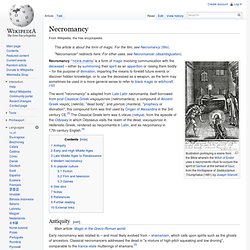
Classical necromancers addressed the dead in "a mixture of high-pitch squeaking and low droning", comparable to the trance-state mutterings of shamans.[5] Theurgy. Definitions[edit] Neoplatonism[edit] Although the Neoplatonists are considered polytheists, they embraced a form of monism.
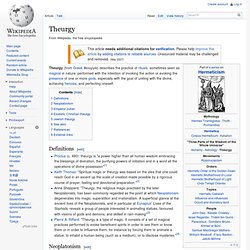
Iamblichus' analysis was that the transcendent cannot be grasped with mental contemplation because the transcendent is supra-rational. What Is a Spirit Guide? - Types of Spirit Guides. Erin Pavlina. Spirit guides are incorporeal beings that are assigned to us before we are born that help nudge and guide us through life.

They’re responsible for helping us fulfill the spiritual contract we make with ourselves before we incarnate. Your higher self helps select these guides, who help us while we are living out our incarnation. Who are these guides? Some guides will stay with you throughout your entire life, and others will pop in every now and again to help you with specific areas of your life or goals you are trying to achieve. The Spirit World. Barbara N.
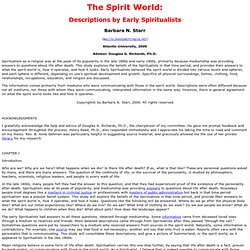
Starr Copyright© by Barbara N. Starr, 2000. All rights reserved I gratefully acknowledge the help and advice of Douglas G. Introduction. Spirit guide. "Spirit guide" is a term used by the Western tradition of Spiritualist Churches, mediums, and psychics to describe an entity that remains a disincarnate spirit in order to act as a guide or protector to a living incarnated human being.
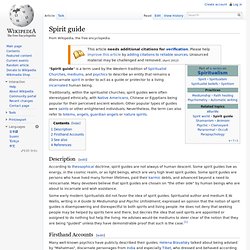
Traditionally, within the spiritualist churches, spirit guides were often stereotyped ethnically, with Native Americans, Chinese or Egyptians being popular for their perceived ancient wisdom. Other popular types of guides were saints or other enlightened individuals. Nevertheless, the term can also refer to totems, angels, guardian angels or nature spirits. Description[edit] According to theosophical doctrine, spirit guides are not always of human descent.
Some early modern Spiritualists did not favor the idea of spirit guides. Firsthand Accounts[edit] Many well-known psychics have publicly described their guides. Spirituality. The term "spirituality" lacks a definitive definition, although social scientists have defined spirituality as the search for "the sacred," where "the sacred" is broadly defined as that which is set apart from the ordinary and worthy of veneration.
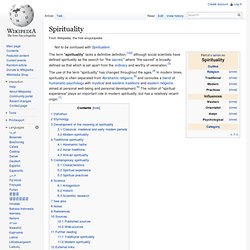
Definition[edit] There is no single, widely-agreed definition of spirituality. Mysticism. Mysticism Index. Contents Start Reading Page Index Text [Zipped] Evelyn Underhill (b. 6 Dec. 1875, d. 15 Jun 1941) was an English Anglo-Catholic writer who wrote extensively on Christian mysticism. Polytheism. Spiritual Traditiions. Esotericism. Esotericism (or esoterism) signifies the holding of esoteric opinions or beliefs,[1] that is, ideas preserved or understood by a small group of those specially initiated, or of rare or unusual interest.[2] The term derives from the Greek, either from the comparative ἐσώτερος (esôteros), "inner", or from its derived adjective ἐσωτερικός (esôterikos), "pertaining to the innermost".[3] The term can also refer to the academic study of esoteric religious movements and philosophies, or to the study of those religious movements and philosophies whose proponents distinguish their beliefs, practices, and experiences from mainstream exoteric and more dogmatic institutionalized traditions.[4] Although esotericism refers to an exploration of the hidden meanings and symbolism in various philosophical, historical, and religious texts, the texts themselves are often central to mainstream religions.

For example, the Bible and the Torah are considered esoteric material.[7]